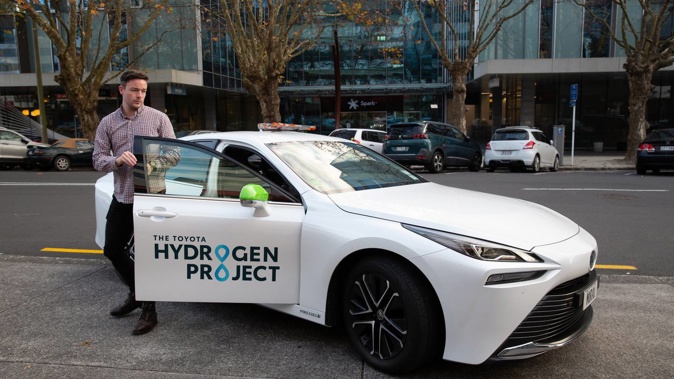
In the shift away from petrol, Toyota is best known as the brand that took hybrid EVs into the mainstream.
But the carmaker has also started to expand its hydrogen efforts.
The Toyota Hydrogen Project Car Share scheme was launched in April and involves the firm partnering with eight Kiwi brands including The Warehouse Group, Air New Zealand, Saatchi & Saatchi, TVNZ, Beca, Westpac NZ, Spark, and Z Energy, to share a fleet of Toyota Mirai hydrogen fuel cell-powered cars, using the Toyota-owned Cityhop platform.
And today Toyota NZ and Obayashi have said they are partnering to provide green hydrogen refuelling for the Toyota Hydrogen Project Car Share scheme.
In mid-2021, Obyashi partnered with Ports of Auckland to launch the city's first hydrogen refueller, situated near the port's Tinley St entrance (the gate across the road from the Britomart Countdown).
The council-owned port did not stick it out for long.
"We reviewed the proposed Hydrogen Demonstration Project in December and made the decision not to continue with the joint venture, as we focus on our core business of port operations," the PoA said in its half-year report, released in February.
But Obayashi doubled down on its commitment, taking over full control of the port refueller (where Toyota's Mirai top up) on July 1.
And a new agreement will see Halcyon Power a joint-venture partnership between Obayashi and Tūaropaki Trust, supply Toyota with 100 per cent green hydrogen - domestically produced at the 1.5 megawatt hydrogen production plant that opened last December at the 113MW Mōkai geothermal power station near Taupo, which is 75 per cent owned by the Trust
It is still very early days for hydrogen cars, of course. Toyota NZ's Project Car Share has seen it top the hydrogen category in the MIA-NZTA sales chart, with 10 new vehicle registrations (all other contenders: 0).
Hybrids will remain Toyota's low-emission mainstay for some time to come - "some time" being however long it takes for a hydrogen refuelling network to develop around New Zealand.
(With hydrogen, which must be stored at absolute zero, there's no equivalent to home-charging in the EV world. The upside is that hydrogen vehicles can be filled up in minutes, and have a longer range; Mirai is rated at 640km but the record for a single trip is 1360km.)
/cloudfront-ap-southeast-2.images.arcpublishing.com/nzme/EOD3L4USJWNMT2QW62KYVUODZI.jpg)
Toyota New Zealand CEO Neeraj Lala says his company was adamant it would only work with a refuelling partner that could provide 100 per cent green hydrogen, to avoid any requirement for carbon offsetting, and ensure the fleet was operating with net zero carbon emissions. “We’re very pleased to be partnering with Obayashi Corporation, who through their partnership with Tūaropaki Trust, are utilising New Zealand’s geothermal resources to provide a completely renewable, zero emissions hydrogen to power the Hydrogen Car Share Project,” he says.
Things are already starting to happen on the hydrogen refuelling network front.
Hiringa Energy, a New Plymouth startup run by former Todd Energy executive Andrew Clennett and its Japanese partner Mitsui, is spending $50m (including $19m in government loans) to build four hydrogen refuelling stations across the North Island - in South Auckland, Tauranga, Hamilton and Palmerston North - which are due to open this year.
It says it will expand into the South Island in 2023, with a long-term plan for 24 stations.
And Southland-based HW Richardson - owner of the Allied chain of service stations - recently revealed plans to install a hydrogen refueller in Gore, and says its rollout could expand to include all of its 125 Allied fuel stops over the next few years.
Hiringa and HWR are aiming their early hydrogen refuelling efforts squarely at the trucking industry, where hydrogen is gaining early traction and the economics are the most compelling.
But UK research outfit Juniper predicts more than a million hydrogen vehicles will be on the road by 2027 - and that 60 per cent of sales will be to consumers as the technology starts to give EVs a run for their money.
Take your Radio, Podcasts and Music with you









